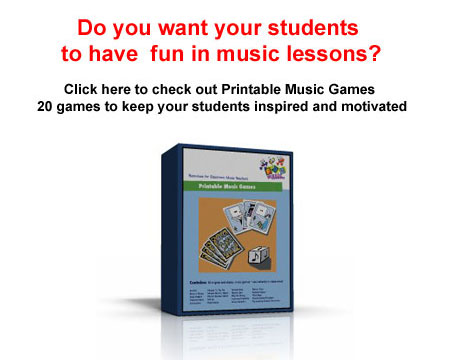
Here are a few tips, tricks and words of wisdom on how to hold the attention of a pre- primary or elementary class which are some of my personal experiences along with some other expert opinions from some of the best in pre school education:
-
“I found it helpful to lower my expectations for the class and treat them more like a pre-k class and that has helped immensely but some days I still want to tear my hair out. I find the more I can surprise them, the better the class goes.”– Heather Barlow
-
“A little trick. If they start to get rowdy inappropriately, we have meditation time where the sit for two minutes and listen to soothing classical music, then we talk about it after. They love it”.-Marsha Davis Wall
-
“Teaching one set of genre of music becomes very boring. But changing the music genre can become very exciting and eager to learn more of who, what and where and time of piece”.- Pauline Herbert
-
“I find that having a lot of different activities in a class period helps: if you keep changing the activity: they love having different things to do! I vary a song with a movement/dance activity with instruments: fast varied with slower, etc.”- Margo Rainone
-
“Fidgety primary classes need lots and lots of movement and tons of activities planned. I would say you need to be prepared to switch gears every two minutes and if their attention lasts longer, then go with it. I have also found that having the attentive kids get the instruments (orff) first often gets the fidgeters to settle quicker or they’ll miss their chance to play!”- Doreen McBride Fraccaro
-
“Distract their attention from the music and each other for a short time by getting them to investigate the other properties of the instruments. So things like “is your cymbal cold? Feel it against your face? Can you put one cymbal on your head and one on your hand/knee? Are they balancing? Well done Jimmy etc. Can you make a T with you claves? Can your hands make a nest for your egg shakers to sit it?” Just take their minds off of everything for a minute and give them a really tricky physical task to focus on. Plus if the instrument parts are separate they don’t make noise – I can’t take credit for these tricks, learn’t them from a very clever 1-5 yr old music teacher I know” – Sonja Mercer -
“I teach Kindermusik and the philosophy of following the child leads to a very positive learning experience. A masterful teacher is able to change up their lesson plan to fit the mood and direction of the class. Implementing ‘Brain Gym’ techniques is very effective in bringing focus together with learning. “Rub your fingers together, now rub your ears from top to bottom” just one way to open cognitive pathways and focus listening behaviour.”- Julie Morris Stewart
-
“Use little cues – one of my favourites for this age group was ” click your ears up” – Janice Tuck
-
“Blowing Bubbles to classical music can be fun for pre-school children, it really surprises them it can be a great motivator because they always love doing it. I always used calm music with a water theme such as ” The Swan” from the Carnival of the Animals composed by St Seans or “Under The Sea” from the movie the Little Mermaid. I always held one bubble blowing pot (to help stop spillage) and blew the to the children as they caught them. As the classes got more experienced, they loved to hold a bubble pot themselves and blow them (I would only have a very small amount of bubble mixture at the bottom of the pot or have very small pots!). The other trick I had with this activity was to let my class know that it’s nearly finished about half way through the song.If their attention span couldn’t cope with the whole song, I would simply fade the music out. I know this activity sounds very basic, but I had children asking me to do this every week and it works well as an incentive activity with a whole group.”– Janice Tuck
-
“Rolling a ball to each class member can help with listening skills. I used calming music like a lullaby. As the children get more controlled with activity a faster classical piece of music such as Perpetuum Mobile composed by Johann Strauss which is a great faster classical song that they could roll the ball, throw the ball or even bounce the ball as a whole class or in pairs– Janice Tuck
-
“Learning to draw music notes to a selection of Classical Music, can help with an easily distracted class. My personalfavorites were the classical pieces “I danced with a Mosquito” the orchestral version composed by Anatole Liadov and “Flight of the Bumble Bee” composed by Nikolay Rimsky – Korsakov. After a while, the children would know what activity these songs meant and if the class was getting too distracted or busy, I would just pop it on to let the pace of the lesson change and we’d settle down to do a five minute activity on basic music note drawing –Janice Tuck For some free, simple note drawing activities, just visit https://funmusicco.com/music-theory-worksheets and you’ll see preschool activities when you scroll down the page until you see the title “Music Theory Worksheets for Young Children”
-
“Games are great! As long as you find a way to make everyone a winner at this age group to avoid any tears, it is a great way of learning, especially with fidgety classes that don’t have a long attention span, without having to give much explanation. Try simple games such as Musical Memory Match, Musical Bingo or Musical Go Fish which are all based on traditional games” – Janice Tuck For some free printable games, visit https://funmusicco.com/educational-music-games
This is a great start, but it’s by no means all there is to know about pre school music lessons!!! I would love to hear about your ideas. What is your single best idea or strategy to tame a difficult pre-school or kindergarten class in music? Please leave your feedback using the comment box below.



Creating some competition within the group might help. Offer prizes for good behaviour and listening, or keep a score board.
Hi,I teach children btween 2 & 6 years. I play the guitar most of the time & usually get the ‘busy child “to come & sit next to me – there is usually at least 1 busy child per class. I even sometimes get the child to sit on my lap & play the guitar with him encircled between my arms & the guitar!!!They love to feel that its a special privelege to be next to the teacher so i would ask them ‘May I sit next to you?”at times. I also get that child to hold my box of instruments,collect the instruments or hold my music – keeps them busy, feeling important & still.
They also love pictures that relate to the song.
I have told the Nutcracker story with the music playing in the background to some very young children with great success.
I usually hand out instruments to children who know or have learnt the song quickly so they are motivated to participate.
Thanks for the other ideas.
Penny
I keep a whistle around my neck. The children know if I blow it they have stop whatever they are doing, stand up and turn around 3 times and sit down. As they get used to that, I add different movements to match blown rhythm patterns. I also introduce–only if necessary–a “the teacher is getting really mad and you better stop everthing and be really quiet” whistle. Works every time!
An activity I did with pre-k, k, and first grade was to take the heavy paper sentence strips and small note pads shaped like different one and two syllable words. I cut them to fit the strips and glued them on in four beat patterns. On the back I put stems and beams to form the pattern in tahs and tee-tees. (put on upside down so that when strips are flipped they are right side up). Two syllable picutes can be cut in half and glued on just a little apart so they know there are two sounds. Ex. bee, bee, flo-wer, bee. Pattern may be clapped or played on instruments.